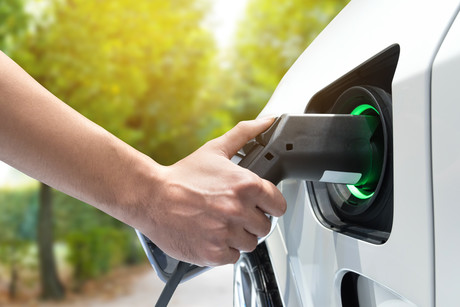Hybrid energy storage system could charge EVs in seconds

Chemists from the University of Glasgow have developed an energy storage system based on a nanomolecule that can store electric power or hydrogen gas, resulting in a hybrid system that can be used as a flow battery or for hydrogen storage.
The nanoscale battery molecule is designed to store energy, releasing the power on demand. When a concentrated liquid containing the nanomolecule is made, the amount of energy it can store increases by almost 10 times. The energy can be released as either electricity or hydrogen gas, meaning that the system could be used flexibly in situations that might need either fuel or electric power.
One potential benefit of this system is that electric cars could be charged in seconds, as the material is a pumpable liquid. This could mean that the battery of an electric vehicle could be ‘recharged’ in roughly the same length of time as petrol cars can be filled up. The old battery liquid would be removed at the same time and recharged ready to be used again.
Writing in the journal Nature Chemistry, the scientists say their research will help pave the way for the development of new energy storage systems that could be used in electric cars, for the storage of renewable energy and to develop electric-to-gas energy systems for when a fuel is required.
“For future renewables to be effective, high-capacity and flexible energy storage systems are needed to smooth out the peaks and troughs in supply,” said Professor Leroy Cronin, the University of Glasgow’s Regius Chair of Chemistry. “Our approach will provide a new route to do this electrochemically and could even have application in electric cars where batteries can still take hours to recharge and have limited capacity.
“Moreover, the very high energy density of our material could increase the range of electric cars, and also increase the resilience of energy storage systems to keep the lights on at times of peak demand.”
Predictive AI model enhances solid-state battery design
ECU researchers are working on ways to make solid-state batteries more reliable with the help of...
Boosting performance of aqueous zinc–iodine batteries
Engineers from the University of Adelaide have enhanced aqueous zinc–iodine batteries using...
Sodium-ion battery breakthrough boosts energy storage
Scientists have discovered that leaving water inside a key material, rather than removing it,...




